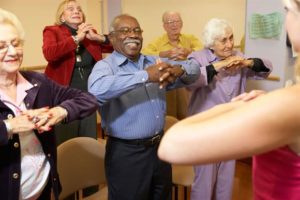 Social Prescribing seems to be one of the buzzwords recently – I hear it everywhere from twitter to meeting clinicians to talking to members of the public helping us with our research. In essence, social prescribing refers to clinicians referring their patients to local, non-clinical social services [1] or activities to help improve their care and well-being.
Social Prescribing seems to be one of the buzzwords recently – I hear it everywhere from twitter to meeting clinicians to talking to members of the public helping us with our research. In essence, social prescribing refers to clinicians referring their patients to local, non-clinical social services [1] or activities to help improve their care and well-being.
So, it’s about encouraging patients to engage in social activities, which are provided in their locality. This could be anything. If you are interested in reading books, then you might join a book club. Or if you are interested in drawing, there might be a local art class offered in your community. Now of course we all have our hobbies, some of which might mean we are already attending some of these local activities. But what if someone hasn’t thought about attending a group activity, or maybe just doesn’t know where to start and what is on offer?
That can be a big problem particularly for older people, the less internet-savvy generation, who might be less likely to google what is available and are more reliant on flyers or word-of-mouth – or in the case of social prescribing more reliant on their clinician.
Engaging in social activities is a key factor contributing to well-being, in dementia [2] and in everyone of us [3]. When we participate in activities that we enjoy, this clearly has a positive effect on our well-being, something that has been highlighted as a priority in dementia care by a recent Alzheimer’s Society Taskforce [4], amongst others.
But as with anything, everyone has different likes and dislikes, and takes part in, or would like to take part in, different activities than maybe the next person. So how can people with dementia be supported in following their interests and taking part in social activities? One important step is to ensure that the person with dementia is actually interested in the activity on offer. It’d be no good making someone go to a dance class when they don’t like the music. So there needs to be a person-centered approach. And with person-centered comes age appropriate – a particular tricky issue with people with young-onset dementia (so before the age of 65). Whilst someone at the age of 80 might enjoy a more sedentary activity of singing, for example, someone with dementia aged just 40 might find this boring and wants to do a more active activity, such as a cycling tour.
Some people might not want to attend dementia-specific activities though, and continue attending those they have been to for years. In that case, it is important for the activity coordinator to be aware of the dementia and possibly adapt an activity slightly to the person. Because this way, there is a far bigger pool of social activities for people to choose from.
Considering that many people with dementia are of old age, and might struggle accessing certain venues or activities on their own due to frailty, services such as Sefton Community Connectors come in handy [5]. A service like Community Connectors supports people to access activities identified by the person, and can support them either from their own home or by meeting them at the venue and joining in the activity together. Equally, befriending services might help people with dementia access activities.
 What might be difficult though, and hinder some people with dementia from enjoying an art or dance class, such as provided by The Brain Charity [6], or a walking tour, might be finances. People from low socio-economic backgrounds are less likely to have the money to pay for transport, be that car or bus or taxi, and pay for an activity. Especially if there are only few (or none?) on offer in their neighbourhoods. They would have to travel further afield to get to do the things they enjoy. It’s not easy to offer a solution to this as a researcher, apart from highlighting the mere importance of social activities to be available to everyone from every background. With plenty of council funding cuts though, it might be more difficult for this to be realised.
What might be difficult though, and hinder some people with dementia from enjoying an art or dance class, such as provided by The Brain Charity [6], or a walking tour, might be finances. People from low socio-economic backgrounds are less likely to have the money to pay for transport, be that car or bus or taxi, and pay for an activity. Especially if there are only few (or none?) on offer in their neighbourhoods. They would have to travel further afield to get to do the things they enjoy. It’s not easy to offer a solution to this as a researcher, apart from highlighting the mere importance of social activities to be available to everyone from every background. With plenty of council funding cuts though, it might be more difficult for this to be realised.
You know that going for a run or [insert your own favourite hobby here] makes you happy, so making sure people with dementia can engage in their favourite activities should be a priority and part of every clinical care pathway. It’s not only tablets that can make you feel better, but sometimes laughing with others, doing something you enjoy, is the best medicine.
Author
Dr Clarissa Giebel [7] is a Postdoctoral Research Associate at the University of Liverpool and NIHR CLAHRC North West Coast. She has been working in dementia care research for over 7 years focusing her research on on helping people with dementia live at home independently for longer.
You can follow Clarissa on Twitter Follow @ClarissaGiebel [8]